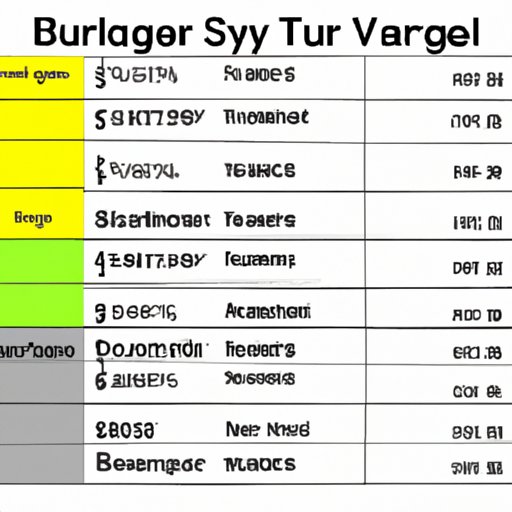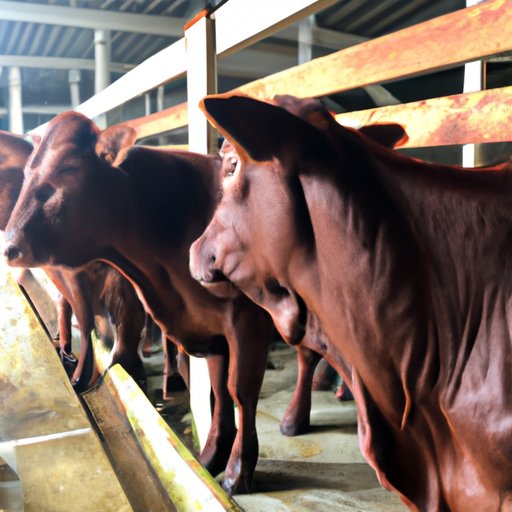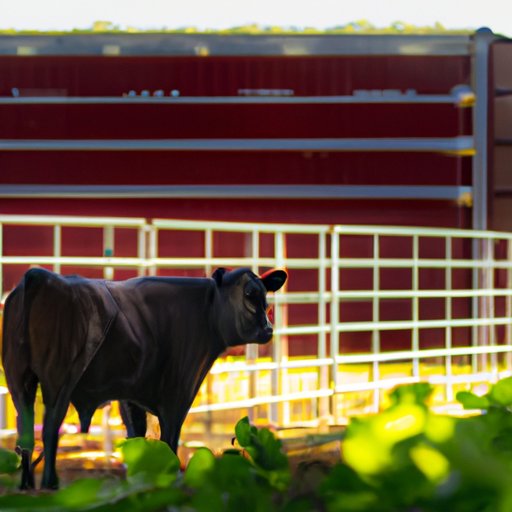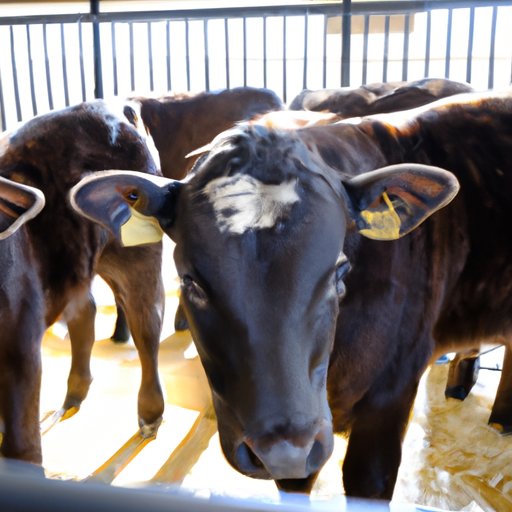Introduction
Wagyu cattle are some of the most sought after and expensive breeds of cattle in the world. These animals are renowned for their high-quality meat, which is why they command such a hefty price tag. But how much does a Wagyu cow actually cost? This article will provide a comprehensive guide to the costs associated with owning a Wagyu cow.
What is Wagyu Beef?
Before diving into the cost of Wagyu cattle, let’s first take a look at what makes them so special. Wagyu is a type of Japanese cattle that has been bred and raised according to traditional methods. The meat from these cows is highly prized for its marbling, tenderness, and flavor. It is often served as steak or sushi, and has become increasingly popular in recent years.
Why are Wagyu Cows so Expensive?
The main reason why Wagyu cows are so expensive is due to their breed, age, quality, and location. These animals have been carefully bred and raised according to traditional methods, which results in a higher quality meat. Additionally, the age and quality of the animal also play a role in determining the cost. Lastly, the location where the Wagyu cow is purchased can also affect the price.
Reviewing the Cost of Wagyu Cattle: A Comprehensive Guide
Now that we’ve taken a look at the basics of Wagyu cattle, let’s dive deeper into the cost of owning one. This section will provide an overview of the prices associated with Wagyu cattle, as well as the factors that can influence the cost.

Overview of Wagyu Cattle Prices
Wagyu cattle are typically sold by the head, and the cost of each animal varies depending on its breed, age, and quality. Generally speaking, the average price for a full grown Wagyu cow ranges from $4,000 to $10,000. Of course, this price range can vary greatly depending on a variety of factors.
Factors That Can Affect the Cost of a Wagyu Cow
As we’ve discussed, the cost of a Wagyu cow can vary greatly depending on several factors. Let’s take a closer look at some of the key factors that can affect the price of a Wagyu cow.
Breed
The breed of a Wagyu cow can significantly affect the cost. There are four main breeds of Wagyu cattle, each of which has its own unique characteristics. The most popular and expensive breed is the Japanese Black, which is the breed used for producing Kobe beef. Other breeds include the Japanese Brown, Japanese Polled, and Japanese Shorthorn.
Age
The age of a Wagyu cow is another factor that can influence the cost. Younger animals tend to be less expensive than older ones, as they have not yet reached maturity. However, it’s important to note that the quality of the meat from a younger animal may not be as high as that from a mature animal.
Quality
The quality of a Wagyu cow can also play a role in the price. The quality of the meat is determined by the degree of marbling, which is the amount of fat within the muscle tissue. The more marbled the meat, the higher the quality and the higher the cost.
Location
Finally, the location where the Wagyu cow is purchased can also affect the cost. Wagyu cattle are typically more expensive in areas with a higher demand, such as Japan or the United States. On the other hand, they may be cheaper in other countries where the demand is lower.
An In-depth Look at the Price Tag of Wagyu Beef
Now that we’ve taken a look at the factors that can influence the cost of a Wagyu cow, let’s take an in-depth look at the price tag of Wagyu beef.
Average Price Range for Wagyu Cows
As mentioned earlier, the average price for a full grown Wagyu cow ranges from $4,000 to $10,000. The exact cost will depend on the breed, age, quality, and location of the animal. Additionally, there are variations in price even within the same breed, depending on the quality of the meat.
Variations in Price Based on Age, Quality, and Other Factors
As we’ve discussed, the cost of a Wagyu cow can vary significantly based on its age, quality, and other factors. For example, younger animals tend to be less expensive than mature ones, while higher quality animals command a higher price tag. Additionally, the cost can also vary based on the location where the animal is purchased.
How Much Does It Cost to Buy a Wagyu Cow?
In addition to the initial purchase price of a Wagyu cow, there are several additional costs associated with owning one. Let’s take a look at some of the expenses you should consider when investing in a Wagyu cow.
The Initial Purchase Price
As we’ve discussed, the initial purchase price of a Wagyu cow can range from $4,000 to $10,000, depending on its breed, age, quality, and location. In some cases, you may be able to negotiate a lower price if you buy multiple animals at once.
Additional Costs Associated with Owning a Wagyu Cow
In addition to the initial purchase price, there are several other costs associated with owning a Wagyu cow. These costs include feed, veterinary care, and housing.
Feed
Wagyu cattle require a specialized diet of high-quality feed in order to produce the best quality meat. Depending on the size of your herd, the cost of feed can add up quickly.
Veterinary Care
Regular veterinary care is essential for keeping your Wagyu cows healthy and productive. The cost of routine checkups, vaccinations, and treatments can add up quickly.
Housing
Providing adequate housing for your Wagyu cattle is also an important consideration. Depending on the size of your herd, you may need to invest in larger pens or barns to accommodate your animals.

The Economics of Owning a Wagyu Cow
In addition to the costs associated with owning a Wagyu cow, there are also potential financial benefits. Let’s take a look at the economics of investing in one of these animals.
The Potential Financial Benefits of Owning a Wagyu Cow
One of the potential benefits of owning a Wagyu cow is the potential for profit. Wagyu beef is highly sought after and commands a premium price. If you are able to produce high-quality meat, you may be able to sell it for a profit.
The Risks Associated with Investing in a Wagyu Cow
Of course, there are also risks associated with investing in a Wagyu cow. The cost of raising and caring for these animals can be quite high, and there is no guarantee that you will be able to recoup your investment. Additionally, the market for Wagyu beef can be volatile, and prices can fluctuate significantly.
What’s the Going Rate for a Wagyu Cow?
Now that we’ve taken a look at the economics of owning a Wagyu cow, let’s take a look at the current prices for specific breeds and qualities of Wagyu cows.
The Japanese Black is the most sought after and expensive breed of Wagyu cattle. Full grown animals typically range in price from $6,000 to $15,000, depending on the quality of the meat. The Japanese Brown, Japanese Polled, and Japanese Shorthorn are less expensive, with prices ranging from $3,000 to $7,000.

The Pros and Cons of Investing in a Wagyu Cow
Before deciding whether or not to invest in a Wagyu cow, it’s important to consider both the advantages and disadvantages. Let’s take a look at the pros and cons of owning one of these animals.
Advantages of Owning a Wagyu Cow
The main advantage of owning a Wagyu cow is the potential for profit. If you are able to produce high-quality meat, you may be able to sell it for a premium price. Additionally, Wagyu beef is highly sought after, so there is always a steady demand for it.
Disadvantages of Owning a Wagyu Cow
On the other hand, there are also several drawbacks to investing in a Wagyu cow. The cost of raising and caring for these animals can be quite high, and there is no guarantee that you will be able to recoup your investment. Additionally, the market for Wagyu beef can be volatile, and prices can fluctuate significantly.
Are Wagyu Cows Worth the Investment?
Ultimately, the decision to invest in a Wagyu cow is a personal one. While there are potential financial benefits, there are also risks associated with owning one of these animals. Before making a decision, it’s important to weigh the pros and cons and decide if the potential rewards outweigh the potential risks.
Conclusion
Owning a Wagyu cow can be a lucrative venture, but it comes with risks. This article has provided a comprehensive guide to the cost of Wagyu cattle, factors that affect the price, and the pros and cons of investing in a Wagyu cow. Ultimately, the decision to invest in a Wagyu cow is a personal one, and it’s important to weigh the potential rewards against the potential risks before making a decision.
(Note: Is this article not meeting your expectations? Do you have knowledge or insights to share? Unlock new opportunities and expand your reach by joining our authors team. Click Registration to join us and share your expertise with our readers.)
